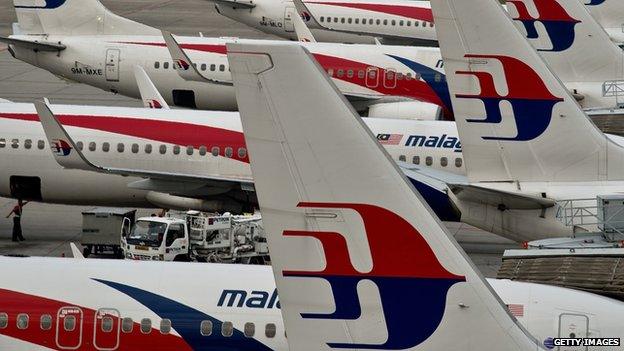Malaysia Airlines faces doubtful future
- Published

Shares in Malaysia Airlines closed down 11% in Malaysia following the crash of flight MH17 in Ukraine en route from Amsterdam to Kuala Lumpur.
Some Asian stock markets also ended the day lower on fears the crash may intensify political tensions between the West, Ukraine and Russia.
This is the second catastrophe to hit the Malaysian airline this year after flight MH370 disappeared in March.
Questions are being asked about whether the carrier can now survive.
"Even if this is pure coincidence, it's never happened in history that a flag carrier has seen two wide-body aircraft disappearing in a few months," said Bertrand Grabowski, head of aviation at DVB Bank, which acts as a banker to Malaysia Airlines.
"The support from the government needs to be more explicit and perhaps more massive."
Investment needed
The company has been losing money for many years and its market value has fallen by more than 40% in the past nine months.
Reports suggest that state investment firm Khazanah Nasional, the major shareholder in the airline, is looking to take the carrier private.
The firm has invested more than $1bn into the airline in recent years and had previously indicated that a major restructuring was on the cards.
Analysts said further investment was needed if the airline was to survive in the short term.
Speaking to the BBC's World Service, Mohshin Aziz, an investment analyst at Maybank in Kuala Lumpur, said the challenges now facing Malaysia Airlines were "insurmountable". Without significant funding, he said the airline would not survive beyond a year.
But even if the airline was to secure financing, questions about its longer-term viability remain, analysts said.
"This latest incident will now compromise the brand from a European perspective," said Leo Fattorini, aviation partner at Bird & Bird.
"You've got to ask whether the brand can survive this latest tragedy."